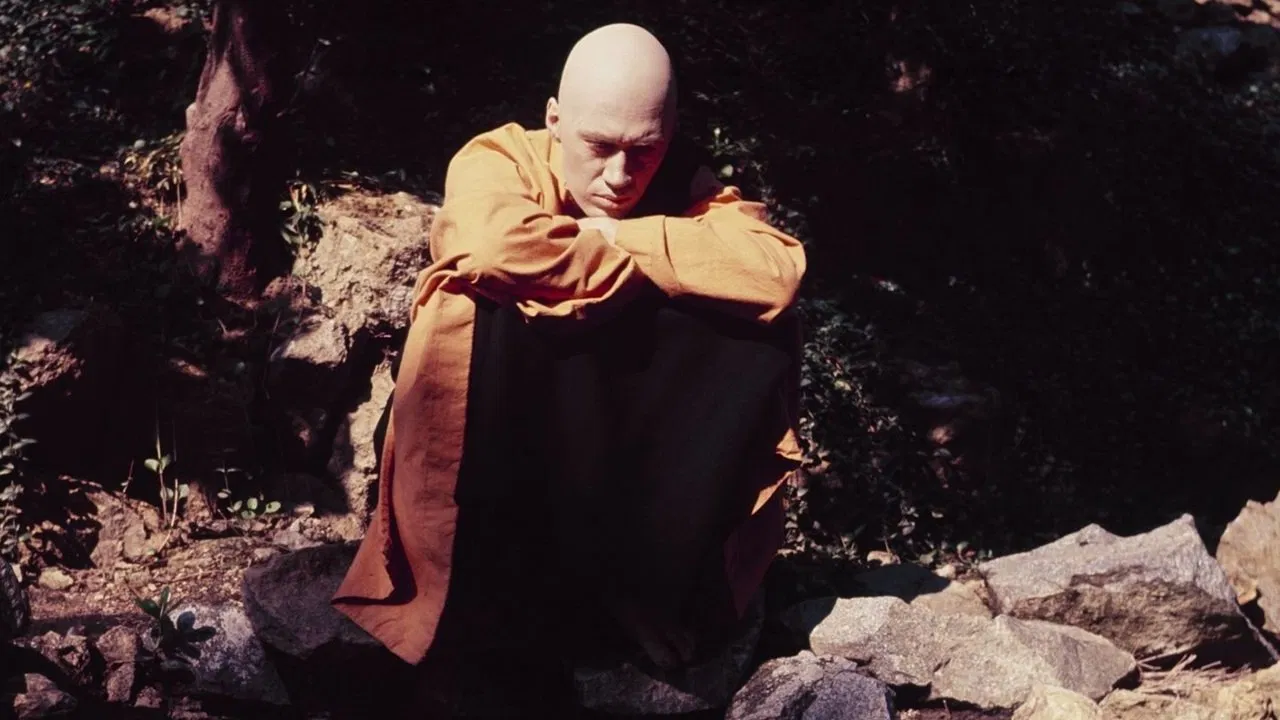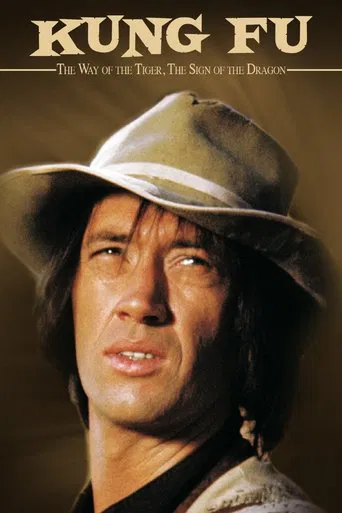

Kung Fu can be watched as a series, but this pilot-movie, at a length that is perfectly agreeable as a self-contained project and only contains the vaguest of to-be-cont'd endings. It was unlike any other show in America at the time, and introduced many to kung-fu who hadn't possibly seen any of the underground movies of the Shaw brothers or just before Bruce Lee really became huge. And, sadly, Bruce Lee was turned down from this show. Maybe it was the right decision not because of the ethnicity barrier (I think a show could have at least been attempted with an Asian lead), but because its focus is rather unique: it's a 'white man' as it were who is a Shaolin monk, Caine, who in a moment of unintentional fury killed a nobleman and had to flee from China to America, where he is often mistaken in the 19th century "old-west" as a "Chinaman".It works, too, that David Carradine has a certain Asian aura about him. This isn't offensive him playing this character (it certainly isn't derided like, say, Mickey Rooney in Breakfast at Tiffany's). The producers and writers of the show actually pay more respect and adherence to the ways of martial arts and its teachings and real professing of non-violence more than other kung-fu movies from China at the time. In fact, one could almost argue it's too respectful, that there's a lack of fun. But, as this pilot shows, which goes between the origin story of Caine in the Shaolin temple and his first real encounter with collective horror and stupidity in man working on a railroad, there's lots of excitement and even philosophizing to be had in the series. And when there is a battle, watch out! It's not bloody, sure, but it is for its time well choreographed and shot for maximum (TV) effect.And what else can be said about David Carradine? The man was just *on* all the time. There's scenes and moments he looks like he's staring off into space, and one isn't sure if it's the character just observing or if Carradine is in some kind of trance. But it's sincere, dedication and craft with a character that makes it count. He's like Eastwood's Man-with-no-name character who says little and makes it count when he does. You simply don't f*** around with the guy, but many do, and it's that archetype that Carradine taps into and mines for all it can be worth for him. It's not the most original story ever, but its got a great twist to it, with (in this case of direction) creative storytelling not unlike techniques started in Point Blank of cutting back and forth in time. Plus a superb lead, and a dependable supporting cast of Chinese-American players.
... View MoreWarner Brothers shows that in the 70's you didn't need a hospital, courtroom nor police station set to create great drama. And compared to the so-called "reality" drek that's pervaded the airwaves over the last several years, one almost wishes it was the 1970s all over again.How do "Survivor", "American Idol", "Big Brother", "The Simple Life" and even the somewhat more high-budgeted "Law & Order" franchise compete with shows like "Kung Fu"? Watching the stories unfold with high production values one becomes puzzled how the "reality" genre ever got a toehold.David Carradine, the well seasoned actor, gives us a monastic Shao Lin outcast in search of refuge and family. The best performances come from all, but I found myself liking Master Po the best, played by the late great Keye Luke. Nitpicking; I would've shot it somewhat differently, and I'm not sure I would've cast Carradine in the role, but, given the character that needed to be portrayed I'm at a loss of who else could've done the job. Carradine is a capable actor who brings us a character (to paraphrase Kwai-Chan) seeks not answers, but only to "understand the questions." If only all humankind had such wisdom.Thankfully Kwai Chan's exploits and insights, and those of his teachers, have been forever preserved on three DVD sets :-) Carradine's character wanders the countrysides of Cathay and and a century old United States in a Western-leaning genre of drama and action.
... View More'KUNG FU was a martial arts show about an asian drifter who was part american the irony was BRUCE LEE was originally slated to star but was deemed not asian enough'It was actually because Bruce Lee was asian that he wasn't chosen to perform. They dressed up an American to look as Asian as possible and hired asian martial artists to perform the kicks and moves.
... View MoreA watershed moment in the history of American television. All who fondly remember the TV series should make a point of seeing the pilot, which is a beautifully crafted, lovingly executed piece of work.It marks, also, the first of Kwai Chang Caine's many adventures in the Wild West; Caine takes up a job laying railroad tracks as part of a gang of cruelly mistreated Chinese immigrant workers. Extensive flashbacks tell the story of Caine's childhood in China, joining the Shao Lin temple after being orphaned, and partaking of a rigorous program of intellectual and physical development.Thus the pilot combines a fairly conventional Western narrative with a dazzlingly innovative Eastern sequence, which is very much the heart of this movie. The producers did their homework, took infinite pains, and the results speak for themselves. Magical sets, moody photography, and meticulous research create an unforgettable impression; to give but one example, observe the moment when the two Kung Fu masters demonstrate their long choreographed sequences of moves on the temple grounds. Most heartwarming of all are the performances (as Masters Kan and Po) by Philip Ahn and Keye Luke, superb actors who had slogged through two lifetimes of unrewarding ethnic parts in cinema and on TV until each at last achieved the role of a lifetime.Good work in the American half of the story by Hollywood pros Albert Salmi and Barry Sullivan, plus a stalwart Asian-American cast who went on to lend distinction to the regular episodes in the 3 seasons of KF that followed (Benson Fong, James Hong, many others). And spare a thought for David Carradine, who combined a mix of decorousness and stubbornness and turned this into one of the most unusual characterizations in the history of television.
... View More